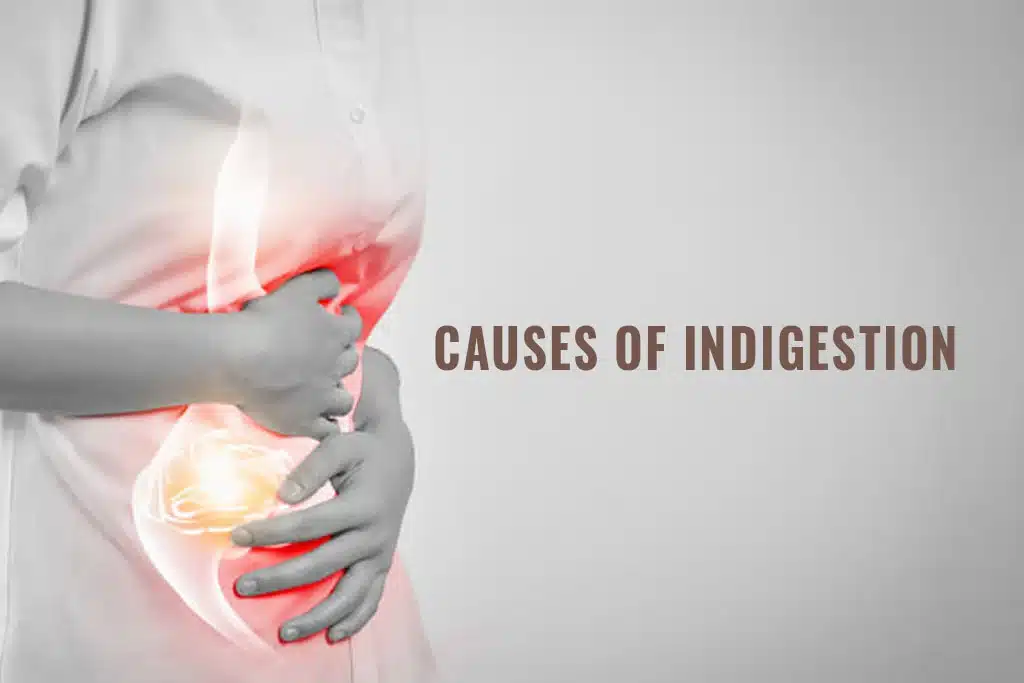Are you struggling with indigestion? Discover a comprehensive guide for fast relief to the discomfort. Indigestion, also referred to as dyspepsia is all too common and harmless. A painkiller may offer you some relief if the same thing happens after taking a large amount of food, you can take an antacid. The pill can be a great remedy for certain types of problems, but if you get Indigestion very often you may have some deeper problems.
It can sometimes indicate that your illness is medically treatable and, so, can be treated by a doctor, such as peptic ulcer disease and acid reflux. Sometimes, it’s more intricate. At ER of Watauga, we are dedicated to providing you with effective healthcare solutions to your health issues with specialized care. In this blog, we will help you know how to deal with common indigestion through home remedies and when to seek a healthcare provider in case of serious concerns.
Understanding Indigestion
Indigestion is pain or discomfort felt after eating as your stomach digests. When medical doctors use the word dyspepsia, they mean the same as poor digestion which is a medical condition people can have. If a stomach upset or an unsettled stomach follow a meal, food materials can be passing through the digestive tract too fast or too slow to break down. Although, it may not be a strained body one every time. It can sometimes just mean that you ate too quickly or the improper thing.
Most people have occasionally suffered from Indigestion. However, it’s an everyday occurrence that lowers the quality of life for certain people. You could find yourself looking for medical attention when your indigestion gets out of control in order to get relief. Treatment may be necessary for an underlying gastrointestinal illness. However, sometimes these symptoms defy an easy explanation.
How long does indigestion last?
Some symptoms of an upset stomach may persist after eating including stomach discomfort, feeling heavy, or the signs themselves. The stomach is an organ that already has the task of ensuring that food is completely digested and will take between three and five hours to digest. During the period between the first and second bite, your stomach secures bile and digest enzymes from the pancreas and gallbladder to promote digestion. They are the organs situated in the upper central abdominal area or epigastric zone, where a person notices symptoms of indigestion.
Causes of Indigestion

Your digestive system becomes occupied with severe work, working harder than usual. As your pancreas, gallbladder, and stomach are actively filling up and emptying, you will be experiencing focused irritation of your tissues. In contrast, however constant discomfort, happening with every meal itself or even appearing in the form of episodes in a few of them, is likely to have a more complex nature. Besides, there may be many other traces of other factors.
The biological causes can appear but extremely rarely, such as any disease. We will, therefore, call this approach functional Indigestion. In the case of functional GI diseases, the reason could be the hypersensitivity of the gut nerve, which can make pain thresholds higher.
Indigestion can often be attributed to three types of causes:
- Your dietary practices.
- Your digestive system is healthy.
- Being confined to small places, your emotions, and your suffering are.
Symptoms of Indigestion
Every time there is stomach pain or discomfort, the digestive tract could be the cause of ailments. The majority of the digestive system organs are positioned in your stomach, so if they are having problems functioning you are probably going to feel it in your belly. Rather than this, it would be much healthier and more productive for the human body to stay away from eating at the postprandial phase, which is the medical phrase for the period of symptoms of indigestion to always occur after eating when your stomach is processing.
Experts largely concur that the following are signs of indigestion:
Stomach ache. The body area surrounding your upper belly is often referred to as the epigastrium. It is precisely behind your belly you will find this.
The feeling of burning. The reason for burning is usually getting into an irritation like gastric acid, enzymes from the GI tract, or inflammation.
The feeling of being long satiated that waits till the deep. The case is similar if you are satisfied very quickly after eating or you still feel this fullness longer, your tummy is very full.
However, indigestion sufferers frequently also describe additional symptoms, like:
- ballooning
- Fuel
- nausea
- Burping
- regurgitation may occur through the repetition of vomiting after taking intake of the food
- reflux of acid
- regurgitation
Furthermore, these symptoms might also be found in the intestinal disease independent of Indigestion, while they sometimes may be observed together with it.
What is indigestion’s primary cause?
The Indigestion characteristic is represented by a burning sensation that comes as a result of acid. In this case, the stomach lining plays a defensive role by protecting it from acid produced by your body. However, sometimes, the lining of the habit is injured. The acid has the effect of irritating and swelling the tissue when the kindling of fire takes place. Be acknowledged that there are a number of less common reasons that result in inflammation of the stomach lining.
Gaze at the stomach may become irritated and occasionally leak into the duodenum (the upper part of the small intestine). This is because the duodenal lining is not as protective as the lining of your stomach, so the acid tends to cause more harm. But there is another dangerous characteristic of acids, that is, these can flow from the top to the bottom of your stomach through your esophagus. That is the acid reflux we refer to it. Thus, your esophagus is not a structure designed to counteract acids either.
These are the types of symptoms that indigestion may inhibit such as burping, regurgitation, and heartburn among others that are induced by acid reflux. The fact that the lining of your stomach is indeed, undamaged at this point, doesn’t necessarily mean that you are not experiencing abdominal discomfort and reflux of the acid in the esophagus. On the other hand, you get mythic peptic ulcers when the acid burns the lining of your stomach, resulting in ulcers affecting both the duodenum and the stomach. In addition, this type of ulcer can cause a sharp burning type of pain.
The other symptoms of indigestion, like early satiety (fullness) and nausea and bloating could be beatifying this disease. Organic pathologies such as stomach ulcers and acid reflux are actually the most common reasons why Indigestion is often persistent. Therefore, the terminology coined by medical professionals now refers to functional pathology of the stomach as “non-ulcer Indigestion.” However, functional pathologies are more prevalent than organic reasons for Indigestion generally.
What else could be the cause?
The following diet and lifestyle choices may be linked to sporadic Indigestion:
- A lot of consumption or to eat fast at all. When one eats excessively it can occur that acid gets pushed downwards making it possible for it to flow out of the top.
- Your diet has been high in fat. These substances are assertive acids and enzymes released from foods that usually have higher fats, they may irritate or damage your tissues.
- Unidentified allergies to foods. Your body may react differently depending on the foods you’re consuming, making it more difficult to digest some of them.
- Alcohol consumption and smoking. The mucous layer of your gestrointestinal lining layer will also be affected by these chemicals. They could result in inflammation.
- Abuse of non-steroidal anti-inflammatory drugs (ibuprofen and aspirin). The excessive usage of NSAIDs might damage the lining of your stomach.
- Anxiety and stress. Your brain can be disturbed by gut-associated nerves, while the gut is affected by the brain.
The following illnesses and ailments may contribute to chronic Indigestion:
- Ulcerative stomach illness
- Disease of gastroesophageal reflux
- A patient with stomach acid proof over the limit is called hyperchlorhydria
- Abdominal pain, which is caused by inflammation of the stomach’s inner wall, is called an-itis
- slow to tired or gastroparesis emptying of the stomach
- Hiatal hernia: a situation where the stomach in turn comes out of the diaphragm with it
- In the first case, bacteria over-grounding can occur in your stomach and intestine
- eating problems
- kidney stones
- a gallbladder that is producing inflammation (cholecystitis)
- pancreatitis, which is defined as pancreatic blocking or inflammation
- Disorder of the irritable bowel or IBS
- gluten intolerance
- blockage in the small intestine also called intestinal obstruction
- stomach cancer
- visceral hypersensitivity
Care and Treatment
Natural Remedies for Indigestion

Most of the time, we get this unrest sensation after eating our food which is called indigestion. This might also affect your day vacation. Luckily, alternative remedies through natural mechanisms and easy life changes can be utilized to find relief and restore orderly digestion.
Ginger
Ginger, a root, yes, but a wonderful one for the digestive system. Ginger causes the contraction of stomach muscles and thereby the response is reduced to pain, nausea, and bloating. Maybe some ginger tea, or ginger candies, if you prefer some more crispier ones, or you can also try it with your meal.
Peppermint
This reinvigorating herb has a slew of effects, including soothing the digestive tract and reducing gastric upset by having the property of being a natural muscle relaxant. Unlike what most people think, don’t forget to enjoy your favorite peppermint tea or simply inhale the refreshing scent of peppermint oil.
Chamomile
Chamomile provides relief for the stomach acid in the gut which is responsible for promoting indigestion and irritation of the gut. It also boasts an anti-inflammatory capability and relieves pain. Heat water to a boil and steep for 10 minutes one or two bags of chamomile tea. This recipe gets a boost from the direction to include a cup of liquid and honey, if desired.
Apple Cider Vinegar
While paradoxical, ambitious drinks are responsible for gastric acid production management. Let’s begin by taking a glass of water with a tablespoon of apple cider vinegar mixed based on personal preference during meal time.
Fennel Seeds
The habit of chewing on fennel seeds after eating is considered to be quite common in a lot of neighborhoods and have a peek at this link. Fennel seeds due to their certain features can help reduce gas and bloat thereby relieving indigestion. Changing the first V into a conjoined word grammatically improves the sentence.
Lifestyle Changes to Alleviate Indigestion

Your milk sugar consumption can be reduced and acute digestion will be gained by making the contributions of natural treatments and lifestyle changes. Remember to go to medical care if your symptoms worsen or if they’ve become chronic.
Healthy Eating Habits
The way you eat can usually be blamed for the malady of your digestion. Consume foods like soups and cereals which are easy to digest rather than those that are processed. Intake of such foods in limited quantities will relieve stomach conditions and the presence of these foods such as oily, spicy, or acidic ones can worsen your stomach.
Portion Control
Indigestion, a common condition, is often the stomach’s response to overeating. To not put too heavy a load on your digestive system, you’ve got to pay heed to your body’s hunger cues and eat much smaller and frequent meals throughout the day.
Slow Eating
Rig your produce completely to lessen the burden on your stomach and have your body transform the food much more quickly.
Stress Management
Continuous stress will only lead to hindering your digestive system from doing its job. Breathing deeply, yoga, and meditation are among the methods that might be applied to decrease stress levels and make your digestive tube region taciturn.
When to Seek Medical Attention
See a doctor if you also experience any concerning symptoms in addition to your Indigestion, such as
- trouble swallowing
- breathlessness
- a sense of oppression that settles in the middle of your body like a tight-fitting shirt
- You passed blood then
- the process also includes projectile vomiting as well as the feeling of being nauseous
- unaccounted-for weight loss.
Conclusion
Indigestion is a quite frequent issue that rarely can be identified as a dangerous occurrence. However, if you encounter it that often, it could be the one that creates distraction for you. It will interfere with the sleep cycle, affecting how you take meals, which ultimately leads to a poor quality of life. It might be no time to worry, but in specific cases, it could be a sign of a serious disease. The digestive system is complex and may be heavily affected by various components. A qualified medical professional can help you to either cope with or adjust to different parts like nutrition and fitness in your life. ER of Watauga is your go-to healthcare provider offering a comprehensive range of diagnostic tests and effective treatments. You can rely on us to acquire individualized care if you are facing the situation of indigestion. Contact us now to book an appointment or for further information.
FAQs (Frequently Asked Questions)
What are a few easy ways to treat indigestion?
You may get some instant relief by drinking ginger tea, nibbling fennel seeds, or diluting apple cider vinegar to any extent we are allowed. Besides, different people have different options.
Which foods need to be avoided if I have Indigestion?
It is often the grilling or frying process, spices in certain food, or acidic ingredients in meals that contribute to bad breath. Restrict foods containing fat such as pork, and beef, fried dishes, fatty and processed snacks, citrus fruits, and tomato-based meals.
How can I avoid experiencing Indigestion in the future?
Highlight being healthy in this process – fight the temptation and go for whole foods, eat smaller portions, and chew properly. De-stress using relaxation techniques and make up for that by having good sleep to improve your digestive system.
When should I visit a physician for Indigestion?
If your indigestion is more severe than average, feels more persistent (you have been suffering recently for more than a few days), or is associated with other unpleasant symptoms such as repeated vomiting, bloody stools, or unexpected weight loss, you should seek medical attention to rule out potential underline-ing medical issues.
Does indigestion have a medication that can help with it?
Antacids (bought-from-store) can remove stomach acid and bring short-term relief Nevertheless, it is advisable to read label instructions and seek advice from a skilled healthcare provider before taking medications, provided your other two conditions allow you to do so.






